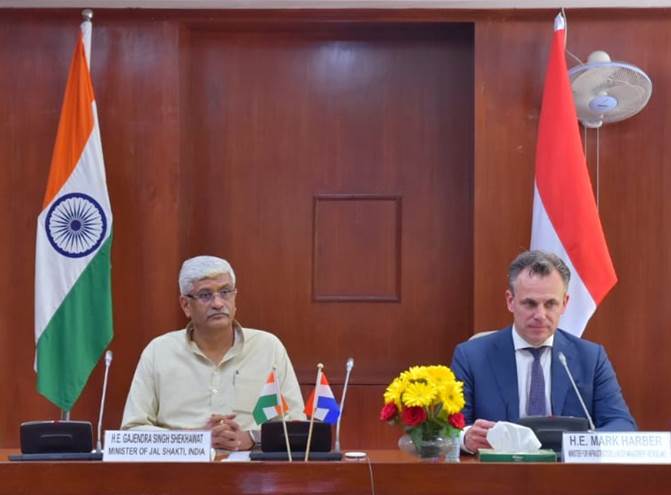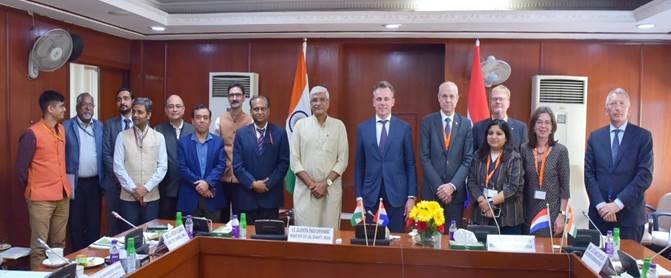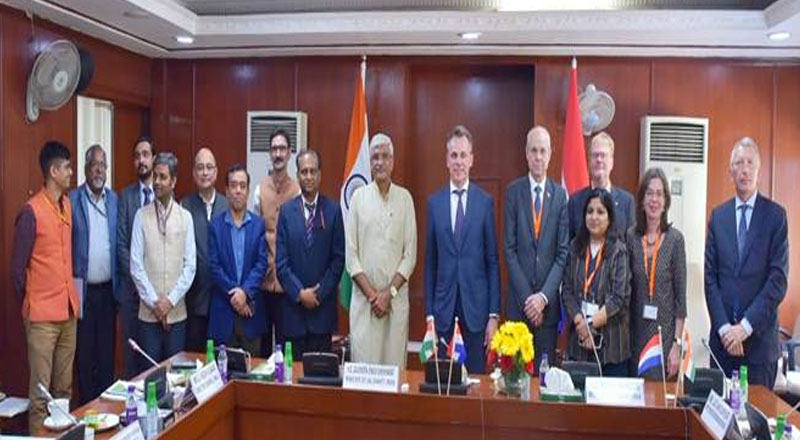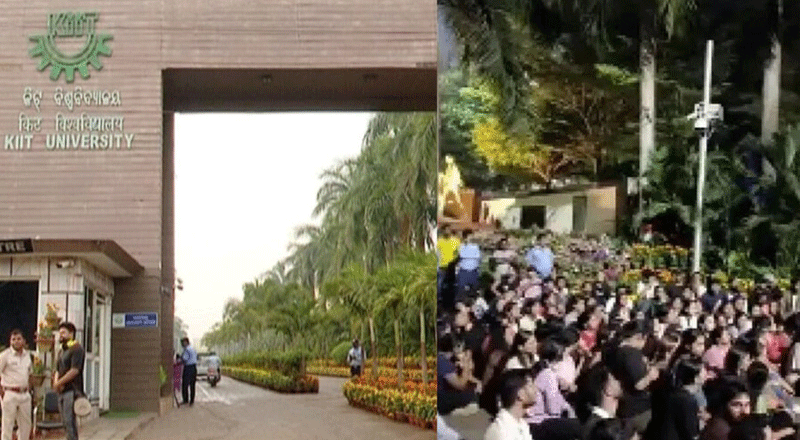The 1st Ministerial-level meeting of the Joint Working Group between India and the Netherlands was held today in New Delhi in the august presence of the Union Minister for Jal Shakti Mr. Gajendra Singh Shekhawat and the Minister of Infrastructure and Water Management, Government of Netherlands, Mr. Mark Harbers. In April 2021 during a virtual meeting between the Prime Ministers of India and the Netherlands ‘Strategic Water Partnership’ was launched. On 29th March 2022, the ‘Strategic Water Partnership’ was signed by Mr. Gajendra Singh Shekhawat, Union Minister for Jal Shakti and Mr. Mark Harbers, Minister of Infrastructure and Water Management. The Partnership provides the necessary impetus to expand the bilateral water cooperation and is a joint effort of Indian and Netherlands Governments, recognizing the importance of Sustainable Development Goals, water safety, water availability and water quality for wellbeing and sustainable development of the present and future generations.
In his opening remarks, the Union Minister for Jal Shakti Shri Gajendra Singh Shekhawat welcomed the guests and said that during the virtual summit between the Prime Ministers of India and the Netherlands in April 2021, the two leaders had a detailed review of the entire spectrum of bilateral relationship and agreed on instituting a ‘Strategic Partnership on Water’ to further deepen the Indo-Dutch cooperation in the water sector. He said that the cooperation was enhanced by the decision to upgrade the Joint Working Group (JWG) on water to the Ministerial-level. The Netherlands is engaged with various States and Municipalities including in the states of Uttar Pradesh, Delhi Gujarat, Punjab, West Bengal, Tamil Nadu, Kerala and Maharashtra in various water resources project. “I am happy to note that both the groups – the Joint Working Group and the Bilateral Technical Group have been able to narrow down to the few areas of intervention under the collaboration which are industrial pollution abatement through multi-stakeholder platform for pollution prevention and effective waste management of textile cluster in Panipat, Haryana, Water as Leverage and Namami Gange, Water as Leverage in Chennai, Room for River Project – Flood Management project with Kerala, Pilot project in the doab of Arnair and Koratalair river and capacity development programmes,” the Union Minister said.

Mr. Shekhawat added that the Indo-Dutch cooperation has progressed on various front since the signing of the ‘Strategic Water Partnership’. “Along with these collaborations, we also thank the Netherlands government for supporting some submission made at the United Nations Water Conference 2023 in New York that includes River-Cities Alliance for river sensitive cities and technologically-driven nature-based solutions for river rejuvenation,” the Minister added. Shri Shekhawat expressed satisfaction over the fact that multi-stakeholder consultative approach is being adopted which has helped in developing comprehensive plans for the water sector. He said that it is now time to act on the plans quickly.
Mr. Mark Harbers expressed his happiness on the fact that India and the Netherlands are contributing constructively to the Water Action Agenda and said that water is a key enabler for prosperity, equality and sustainability. “We need to prepare and cooperate globally to address the emerging climate and environmental challenges,” he said, adding, “The challenges of both our countries such as spatial and temporal variations in rainfall, pollution etc. are similar and the basis of our coming together are these shared challenges.”
The extensive list of activities started in recent years between India and the Netherlands exemplifies that we have come together through the ‘Strategic Water Partnership’. “I wish a very interesting, constructive and productive 1st Ministerial-level Joint Working Group meeting,” Mr. Harbers said, adding that a strong cooperation is imperative to find proper solutions to the similar climate and environmental issues staring at the world.
Both the Ministers showed optimism towards the results presented under the interventions in the industrial pollution abatement project through multi-stakeholder platform for textile cluster in Panipat, Haryana.

Welcoming the delegations, Shri G. Asok Kumar gave a brief overview and journey of the India-Netherlands cooperation in the water sector and called the 1st Ministerial-level meeting of the Joint Working Group the “culmination” of the efforts started with the visit of Dutch Prime Minister Mr. Mark Rutte to India in 2015 followed by the visit of the Hon’ble Prime Minister of India Shri Narendra Modi to the Netherlands in June 2017 to mark the 70th anniversary of the diplomatic relationship between India and the Netherlands. “The visit provided a significant boost to the bilateral ties and a Memorandum of Understanding (MoU) was signed between the Ministry of Water Resources, India & Ministry of Infrastructure & Environment of Netherlands in June 2017 to strengthen the collaboration between the two countries in the field of water, delta management and water technology.
Joint Secretary (EW), Ministry of External Affairs, Mr. Sandeep Chakravorty while making intervention desired that the activities under the framework may also be carried to other geographical areas including Bangladesh, Nepal, Indonesia and Africa.
The work plan of the Joint Working Group includes three Action Plans on bilateral water cooperation with: 1. Ministry of Jal Shakti in particular National Mission for Clean Ganga, Ministry of Irrigation, Kerala and Ministry of Irrigation and Waterways, West Bengal.
Action Plan Jal Shakti/NMCG – The Netherlands consists of five program areas including Sustainable water quality management, Urban water management, Monitoring and decision making, Living with and valuing of water, Resilient water systems and Sustainable Water Quality Management. This program area will support the efforts of NMCG and other governmental organizations in India to improve the water quality of the water systems. It will cover water quality issues in a river basin, e.g. Ganga basin, and might also cover knowledge needs of state governments and other institutions involved in water quality management. Urban water management will bring together the on-going activities of the River Cities Alliance (RCA) in India and the Water as Leverage (WaL) program initiated by the Netherlands. The core objective of RCA is to provide the member cities with a platform to discuss and exchange information on aspects that are vital for sustainable management of urban rivers.
Under the Monitoring and Decision making program, efforts will be made to make proper use of the data, collected at different levels, available in India. Some of this data is made public, other data is classified or kept for internal use only. The challenge is use this hydrological data for decision making, investments or operational purposes.
Living with and valuing water component relates to the Aviral Ganga (Unrestricted Flow) and Arth Ganga (economy and livelihood) components of Namami Ganga. Aviral Ganga and Arth Ganga in India are based on the same principles as several concepts in the Netherlands such as Living with Water and Building with Nature. Resilient water systems is oriented at achieving water security at local and basin level and making the water systems resilient to cope with variable conditions.
Action Plan Kerala – The Netherlands will focus on knowledge exchange and capacity building. Related to river basement management knowledge exchange will be on Integrated Water Resource Management. 1. Integrated Water Resource Management (IWRM) – Materialize IWRM concept in Kerala; – Address the challenges in integrated river basin management; – Mitigation of urban flooding and sharing institutional mechanisms; – Utilize Nature Based Solutions, such as ‘Room for the River’ and ‘Living with Water’.
Action West Bengal – The Netherlands action plan is divided in two periods: 1. Exploratory phase (2022 – 2023) of Capacity building to be conversant with dike design and construction as per state-of-the-art international good practices, an outline for holistic master plan, including a strategy towards a healthy river basin; basic understanding of coastal zone management.
The aim of the Strategic Water Partnership is to further intensify and expand on-going bilateral cooperation through involving policy experts, academia, knowledge institutes, private companies and communities/stakeholders and combining resources, expertise, knowledge skills. The Partnership adds strategic direction to the cooperation in order to maximize the benefits for both countries. The character of the Strategic Water Partnership is knowledge cooperation in which each partner will finance its own expenses arising from the cooperation. Knowledge exchange will mainly take place by interaction between Indian and Netherlands experts and officials.
The Netherlands delegation included Mr. Luit-Jan Dijkhuis, Ministry of Infrastructure and Water Management, Ms. Jet van Paassen, Social Media Advisor, Ministry of Infrastructure and Water Management, Mr. Thorsten Wege, Senior Policy Coordinator, International Affairs, Ms. Odilia Knap, Deputy Director, International Affairs, Mr. Joost Geijer, Head of Economic Affairs at the Netherlands Embassy and Ms. Nishi Chandra Pant, Senior Policy Officer, Netherlands Embassy.
The Indian delegation comprised of Mr. G. Asok Kumar, Director General, National Mission for Clean Ganga, Mr. Prabhat Kumar Mishra, Principal Secretary, Irrigation & Waterways Department, West Bengal, Mr. Kushvinder Vohra, Chairman, Central Water Commission and Shri Subodh Yadav, Joint Secretary, Department of Water Resources, River Development and Ganga Rejuvenation, Ministry of Jal Shakti, Mr. Sandeep Chakraborty, Joint Secretary (EW), Ministry of External Affairs, Mr. D.P. Mathuria, Executive Director (Technical), NMCG, Mr. Sunil Kumar, Chairman, Central Groundwater Board, Mr. R. Priyesh, Chief Engineer, Kerala, Smt. Sreedevi P., Chief Engineer, Kerala, Mr. Sudhir Kumar, Director NIH and Mr. Dheeraj Joshi, DS, NMCG.





